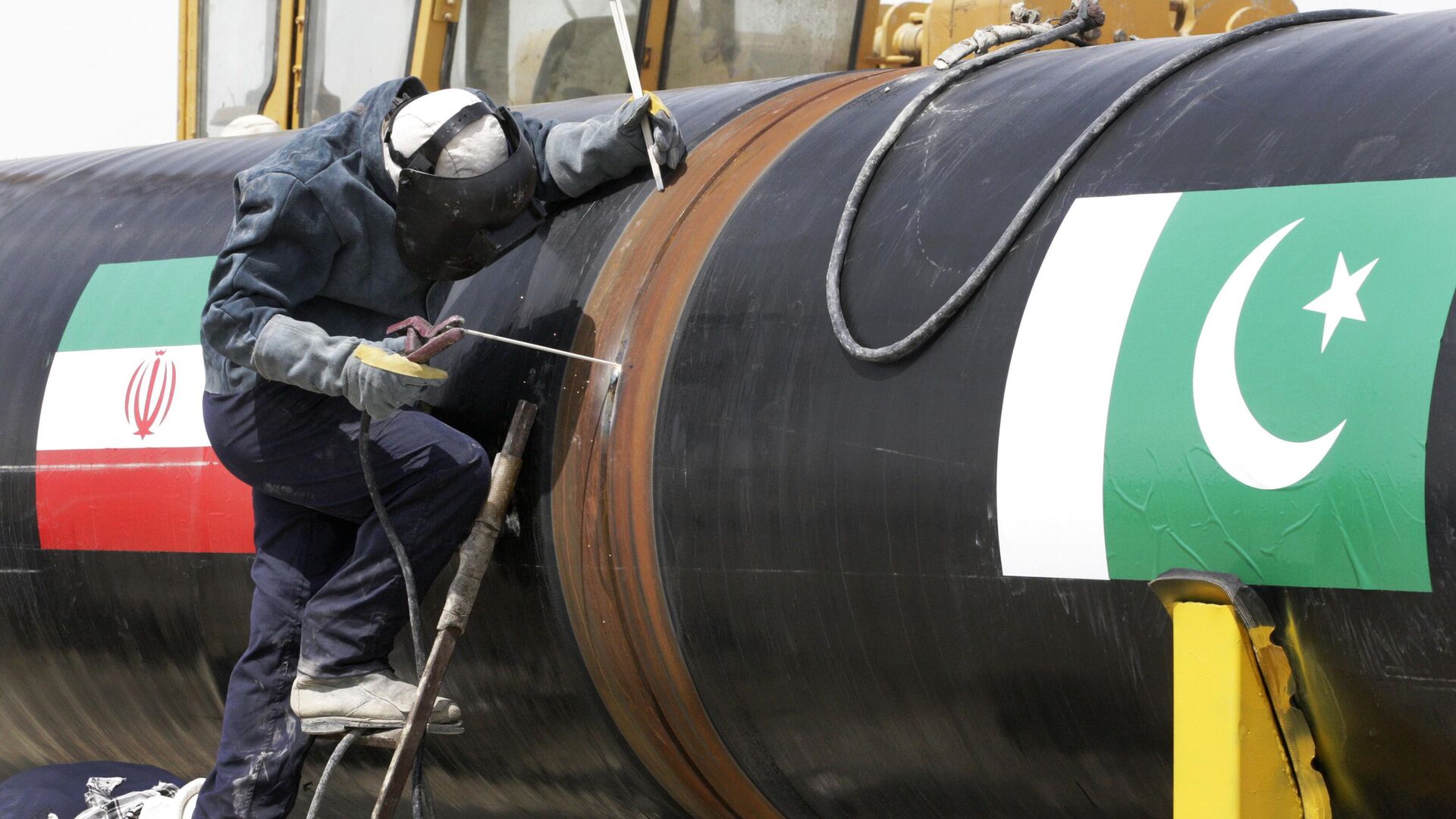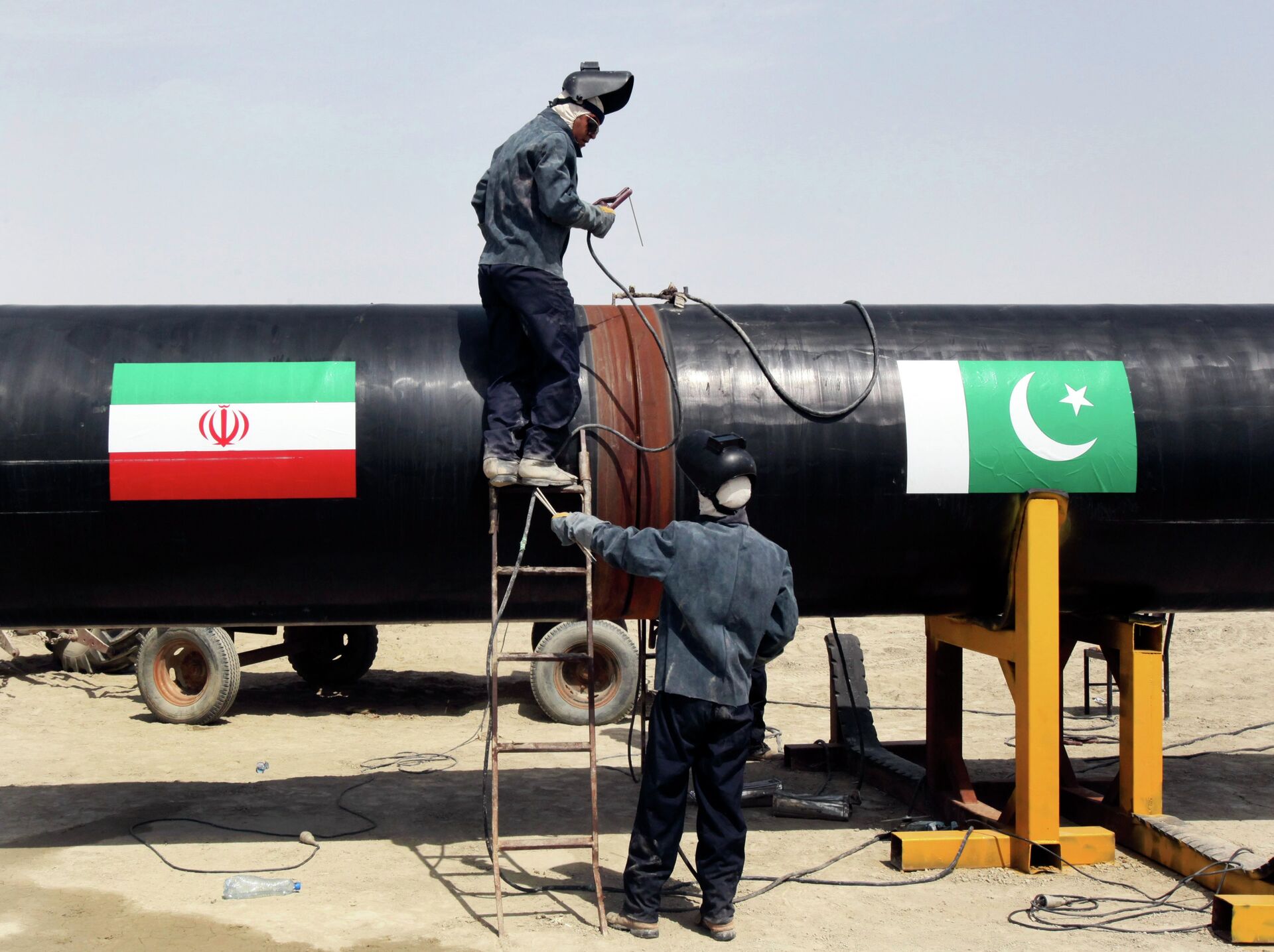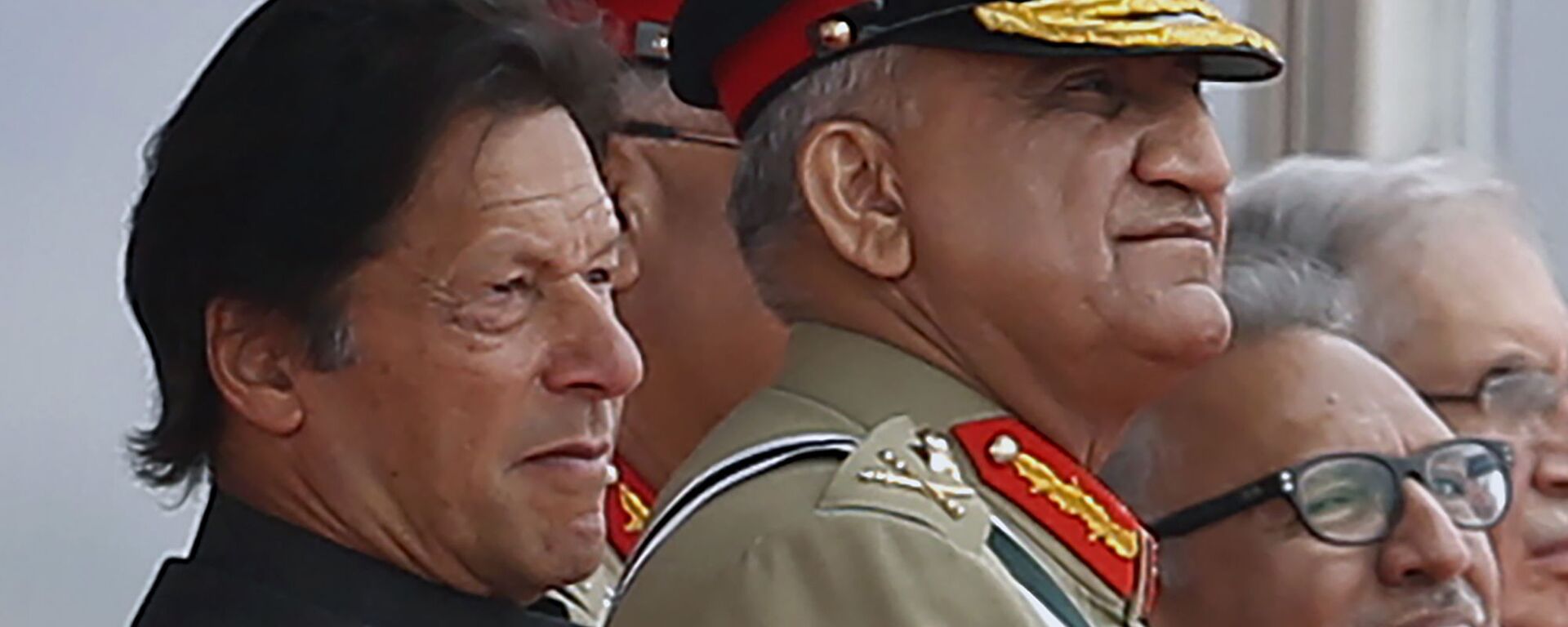https://sputniknews.in/20240329/why-us-threatens-to-sabotage-beneficial-pak-iran-gas-pipeline-6976284.html
Why US Threatens to Sabotage Beneficial Pak-Iran Gas Pipeline
Why US Threatens to Sabotage Beneficial Pak-Iran Gas Pipeline
Sputnik India
The US State Department has warned Pakistan that Washington does not support the Iran-Pakistan gas pipeline going forward, and Islamabad risks coming in contact with US sanctions if it pursues the project.
2024-03-29T17:48+0530
2024-03-29T17:48+0530
2024-03-29T17:48+0530
pakistan
us
iran
us state department
s-400 air defense systems
gas pipeline
gas exports
oil and gas reserves
western sanctions
balochistan
https://cdn1.img.sputniknews.in/img/07e7/0b/11/5453218_0:160:3072:1888_1920x0_80_0_0_1893ca38932f5fbf6cc5720684191588.jpg
The US State Department has warned Pakistan that Washington does not support the Iran-Pakistan gas pipeline going forward, and Islamabad risks coming in contact with US sanctions if it pursues the project."It may be dangerous to be America's enemy, but to be America's friend is fatal", late former US Secretary of State Henry Kissinger once remarked - and the US has proven him right. Time and again, it has shown that it is not a reliable ally in global affairs.This time Pakistan, considered by many to be a US ally, is paying a heavy price of this “friendship”.'Peace Pipeline' Stuck in a Pipeline?The Pakistan-Iran gas pipeline, known as the "Peace Pipeline", is a long-term mega project between Tehran and Islamabad that has faced delays and funding challenges for several years. The pipeline would transport natural gas from Iran to neighbouring Pakistan.Iran has completed its side of the project with a 900 km pipeline, but Pakistan has not. In February, the Pakistani government announced that it had decided to start building an 80-kilometre segment of the pipeline, extending from the Iranian border to Gwadar in Pakistan, but only after Iran warned Pakistan that it would petition the Paris-based International Arbitration for the delay and demand an $18 billion penalty from Pakistan if the case goes to arbitration.'Peace Pipeline's' Benefits for Pakistan and IranThe Iran-Pakistan gas pipeline project is expected to bring several economic benefits to both countries. For Pakistan, first and foremost it would boost energy security by securing a reliable supply of natural gas, providing gas to millions of households, especially in Balochistan and Sindh provinces.Furthermore, the project is expected to catalyse economic activity, particularly in Balochistan, and contribute to the overall economic progress of the country. The enhanced gas supplies would improve the confidence of local industry, and due to common the border with Iran, financially and geographically, the pipeline is considered the most viable option for Pakistan.Meanwhile, Iran stands to benefit financially from the project, as the pipeline would provide a steady stream of revenue for Iran from the sale of its natural gas.Furthermore, the project could help Iran strengthen its ties with Pakistan and potentially other countries in the region.Most importantly, the pipeline could increase Iran’s strategic influence in the region and allow it to utilize its vast natural gas reserves, which are the second largest in the world after Russia.US on Way to Crash Mega Project for Millions of PakistanisDespite all the mutual benefits of this project, it has been mired by many pitfalls, primarily due to US interference in the matter.The US and Iran have had poor relations for over 40 years and US sanctions on the nation have deterred Pakistan from moving forward with the construction of the pipeline. But Iran, which has spent millions on the construction of the pipeline since 2014, has already extended the deadline for the gas pipeline project with Pakistan by 180 days to September 2024.Now Pakistan's petroleum minister, Musadik Malik, has said that Islamabad will seek an exemption from US sanctions over the gas pipeline project. However, the situation remains complicated, as now Pakistan risks facing US sanctions if it goes ahead with the project, but if it doesn't hold up its end of the deal with Iran, it could risk a heavy fine - which considering Pakistan's fragile economy, would add to its debt load.So why is the US putting Pakistan in such a complicated situation, when there is potential benefit for millions of Pakistanis from this pipeline? Sputnik India discussed the matter with the director of the UK-based Midstone Centre for International Affairs, Faran Jeffery.Some Pakistani commentators also point towards the waiver India got from the US when purchasing Russia’s S-400 missile defence system. Talking about why the US cannot allow Pakistan to receive the same waiver in regards to the gas pipeline, Jeffery said that India is not only a much larger market, but also a "much more critical strategic, defence and trade partner for Washington".Although the caretaker government in Pakistan recently announced the construction of a portion of the 80-kilometre pipeline within its territory to pre-empt potential legal disputes with Iran in international courts, it is unclear whether the government will actually proceed with it.Pakistan and the US have had a complicated relationship over the years, fuelled by Washington’s dependence on Pakistan to supply its troops during its long war in Afghanistan, but also plagued by accusations that Islamabad did not manage to curb terrorism within the country and provided safe haven for some terrorists. Meanwhile, some Pakistani politicians, like former Prime Minister Imran Khan, have also accused Washington of meddling in Pakistan’s domestic politics, charges that Washington denies.
https://sputniknews.in/20240207/us-hypocrisy-in-pakistan-covert-regime-change--imran-khans-unjust-imprisonment-6472346.html
pakistan
us
iran
balochistan
Sputnik India
feedback.hindi@sputniknews.com
+74956456601
MIA „Rossiya Segodnya“
2024
Aneela Rashid
https://cdn1.img.sputniknews.in/img/07e6/0c/0d/74548_0:0:485:484_100x100_80_0_0_821526e967ae85d041e2d30ee34fa1de.jpg
Aneela Rashid
https://cdn1.img.sputniknews.in/img/07e6/0c/0d/74548_0:0:485:484_100x100_80_0_0_821526e967ae85d041e2d30ee34fa1de.jpg
News
en_IN
Sputnik India
feedback.hindi@sputniknews.com
+74956456601
MIA „Rossiya Segodnya“
Sputnik India
feedback.hindi@sputniknews.com
+74956456601
MIA „Rossiya Segodnya“
Aneela Rashid
https://cdn1.img.sputniknews.in/img/07e6/0c/0d/74548_0:0:485:484_100x100_80_0_0_821526e967ae85d041e2d30ee34fa1de.jpg
iran-pakistan gas pipeline, us and pakistan, pakistan, iran
iran-pakistan gas pipeline, us and pakistan, pakistan, iran
Why US Threatens to Sabotage Beneficial Pak-Iran Gas Pipeline
The Pakistan-Iran gas pipeline, which is expected to be beneficial for Pakistan, according to experts, could be challenged by US sanctions.
The US State Department has warned Pakistan that Washington does not support the Iran-Pakistan gas pipeline going forward, and Islamabad risks coming in contact with US sanctions if it pursues the project.
"It may be dangerous to be America's enemy, but to be America's friend is fatal", late former US Secretary of State Henry Kissinger once remarked - and the US has proven him right. Time and again, it has shown that it is not a reliable ally in global affairs.
This time Pakistan, considered by many to be a US ally, is paying a heavy price of this “friendship”.
'Peace Pipeline' Stuck in a Pipeline?
The Pakistan-Iran gas pipeline, known as the "Peace Pipeline", is a long-term mega project between Tehran and Islamabad that has faced delays and funding challenges for several years. The pipeline would transport natural gas from Iran to neighbouring Pakistan.
Iran has completed its side of the project with a 900 km pipeline, but Pakistan has not. In February, the
Pakistani government announced that it had decided to start building an 80-kilometre segment of the pipeline, extending from the Iranian border to
Gwadar in Pakistan, but only after Iran warned Pakistan that it would petition the
Paris-based International Arbitration for the delay and demand an $18 billion penalty from Pakistan if the case goes to arbitration.
'Peace Pipeline's' Benefits for Pakistan and Iran
The Iran-Pakistan gas pipeline project is expected to bring several
economic benefits to both countries. For Pakistan, first and foremost it would boost energy security by securing a reliable supply of natural gas, providing gas to millions of households, especially in Balochistan and Sindh provinces.
Furthermore, the project is expected to catalyse economic activity, particularly in Balochistan, and contribute to the overall economic progress of the country. The enhanced gas supplies would improve the confidence of local industry, and due to common the border with Iran, financially and geographically, the pipeline is considered the most viable option for Pakistan.
Meanwhile, Iran stands to benefit financially from the project, as the pipeline would provide a steady stream of revenue for Iran from the sale of its natural gas.
Furthermore, the project could help Iran strengthen its ties with Pakistan and potentially other countries in the region.
Most importantly, the pipeline could increase Iran’s
strategic influence in the region and allow it to utilize its vast natural gas reserves, which are the second largest in the world after
Russia.
US on Way to Crash Mega Project for Millions of Pakistanis
Despite all the mutual benefits of this project, it has been mired by many pitfalls, primarily due to
US interference in the matter.
The US and Iran have had poor relations for over 40 years and US sanctions on the nation have deterred Pakistan from moving forward with the construction of the pipeline. But Iran, which has spent millions on the construction of the pipeline since 2014, has already extended the deadline for the gas pipeline project with Pakistan by 180 days to September 2024.
Now Pakistan's petroleum minister, Musadik Malik, has said that Islamabad will seek an exemption from US sanctions over the gas pipeline project. However, the situation remains complicated, as now Pakistan risks facing US sanctions if it goes ahead with the project, but if it doesn't hold up its end of the deal with Iran, it could risk a heavy fine - which considering Pakistan's fragile economy, would add to its
debt load.
So why is the US putting Pakistan in such a complicated situation, when there is potential benefit for millions of Pakistanis from this pipeline? Sputnik India discussed the matter with the director of the UK-based Midstone Centre for International Affairs, Faran Jeffery.
"To be clear, this has been the US position since day one, so there is no real change in the US position on the pipeline. Washington’s relations with Iran have been thorny for a long time and the US has issued multiple rounds of sanctions on Iranian entities. Islamabad has been hoping that it will be able to get a US waiver on the gas pipeline project. How exactly does Islamabad hope to achieve that is not completely clear", the director said.
Some Pakistani commentators also point towards the waiver India got from the US when purchasing Russia’s S-400 missile defence system. Talking about why the US cannot allow Pakistan to receive the same waiver in regards to the gas pipeline, Jeffery said that India is not only a much larger market, but also a "much more critical strategic, defence and trade partner for Washington".
"Pakistan, on the other hand, has lost much of its geostrategic importance for Washington since the US military withdrawal from Afghanistan. Pakistan simply doesn’t have going for it what India does", according to the director.
Although the caretaker government in Pakistan recently announced the construction of a portion of the 80-kilometre pipeline within its territory to pre-empt potential legal disputes with Iran in international courts, it is unclear whether the government will actually proceed with it.
"It is not clear what would be the next step of Islamabad but it is clear that Pakistan won’t risk US sanctions for this pipeline. So if there is no US waiver, I simply don’t see this project moving forward anytime soon", Jeffery told Sputnik.
Pakistan and the US have had a complicated relationship over the years, fuelled by Washington’s dependence on Pakistan to supply its troops during its long war in Afghanistan, but also plagued by accusations that Islamabad did not manage to curb terrorism within the country and provided safe haven for some terrorists.
Meanwhile, some Pakistani politicians, like former Prime Minister Imran Khan, have also accused Washington of meddling in Pakistan’s domestic politics, charges that Washington denies.




